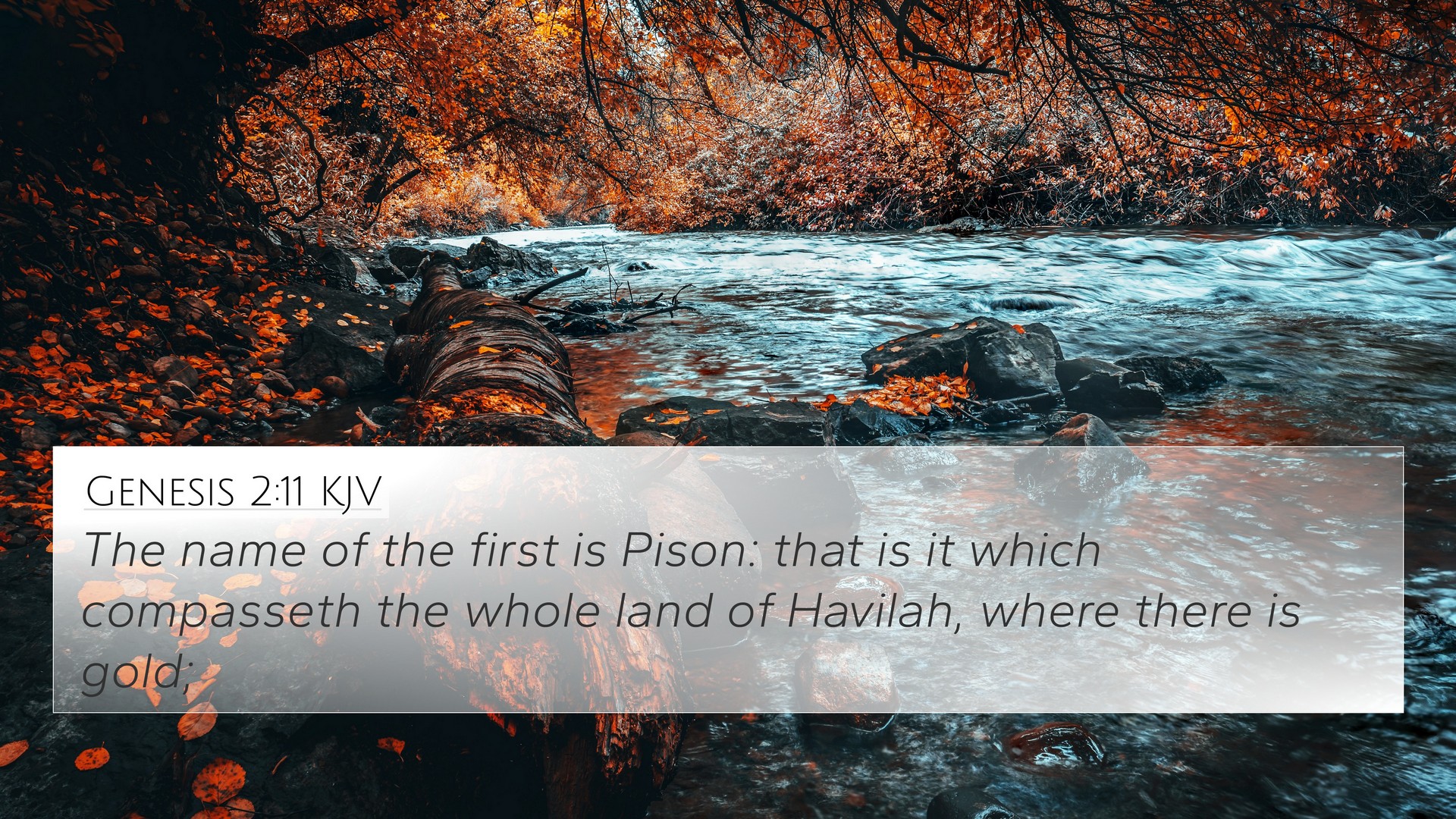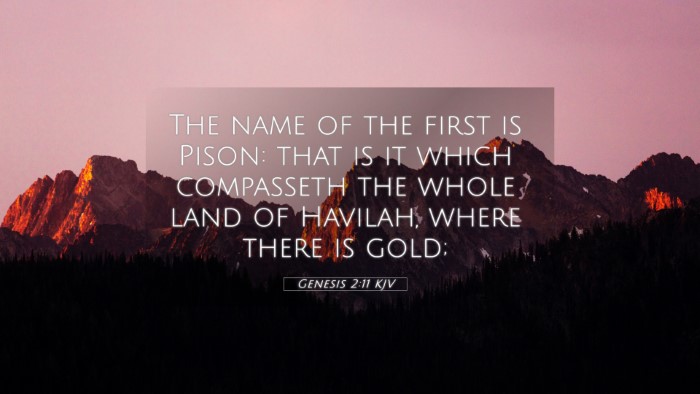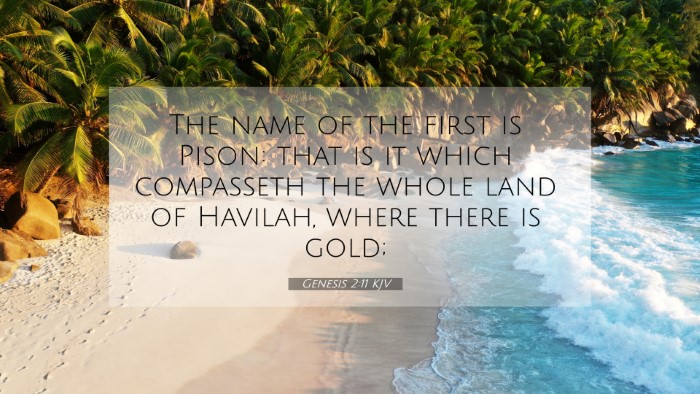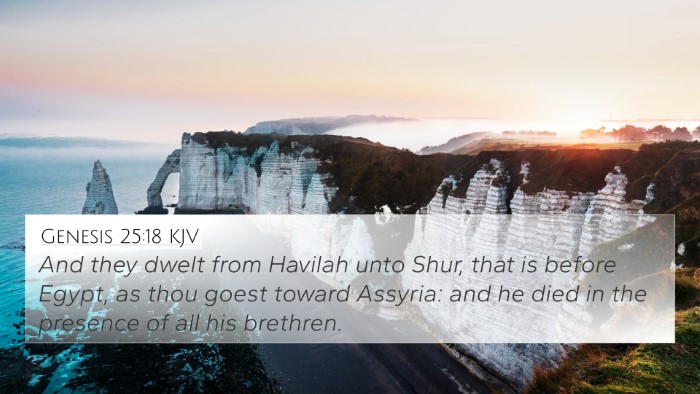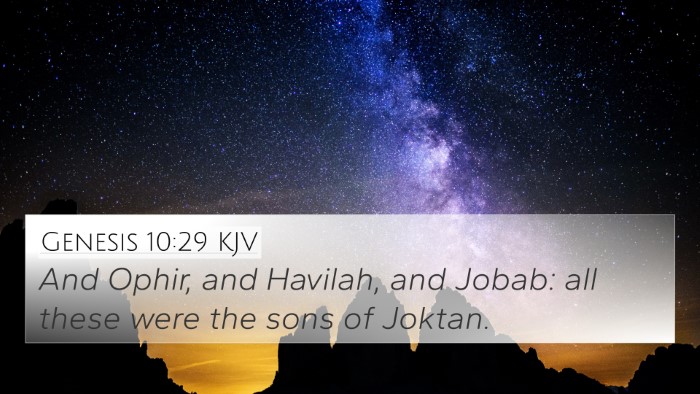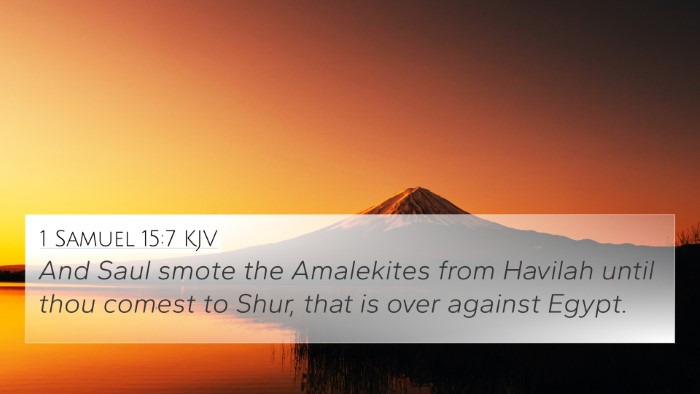Genesis 2:11 - Overview
The verse Genesis 2:11 states, "The name of the first is Pishon: that is it which compasseth the whole land of Havilah, where there is gold." This verse details the first river mentioned in the Bible and provides insights into the geographical richness of the region known as Havilah. Understanding this verse requires an appreciation of the broader context of creation, human habitation, and the significance of natural resources.
Historical Context
In creating the world, God assigned names and attributes to various features of creation. The mention of Pishon signifies not only the physical geography but also the providential care of God in providing for His creation. It echoes themes found in various biblical texts where land and water serve as metaphors for abundance and divine blessing.
Insights from Public Domain Commentaries
- Matthew Henry: Matthew Henry comments on the significance of naming the rivers, indicating that it symbolizes human stewardship and the divine order established at creation. He notes that the mention of gold suggests that Havilah was a place of great wealth and opportunity, which God provided for humankind's well-being.
- Albert Barnes: Albert Barnes points out that the delineation of the rivers in Genesis signifies the providence of God in the arrangement of resources for human sustenance. He sees the reference to gold as indicative of God's blessing and the prosperity that follows obedience. Barnes links this back to the theological emphasis on the goodness of creation.
- Adam Clarke: Adam Clarke analyzes the geographical aspect of this verse, suggesting that the identification of rivers plays a crucial role in understanding the biblical geography of the ancient world. Clarke also emphasizes the spiritual implications of wealth, warning that material riches must lead to a greater responsibility towards God.
Connections Between Bible Verses
Genesis 2:11 establishes critical connections with other biblical verses. Here are several key cross-references:
- Genesis 2:12: "And the gold of that land is good: there is bdellium and the onyx stone." This verse directly explains the value of Havilah and links back to the prosperity introduced in Genesis 2:11.
- Genesis 1:28: "And God blessed them, and God said unto them, Be fruitful, and multiply, and replenish the earth, and subdue it." This highlights the intended prosperity and dominion humans have over God's creation, which includes the resources mentioned in Genesis 2:11.
- Exodus 25:3: "And this is the offering which ye shall take of them; gold, and silver, and brass..." The association of gold connects Genesis 2:11 with the offerings that beautified the tabernacle, underlining the importance of wealth in God’s plan.
- Matthew 6:19-21: "Lay not up for yourselves treasures upon earth..." This New Testament passage reflects on the use of wealth and challenges believers to focus on eternal rather than fleeting earthly treasures, echoing the prosperity discussed in Genesis 2:11.
- 1 Timothy 6:10: "For the love of money is the root of all evil..." This verse provides a cautionary perspective on wealth, connecting back to the richness found in Genesis 2:11 with a moral lesson about its potential dangers.
- Proverbs 10:22: "The blessing of the LORD, it maketh rich, and he addeth no sorrow with it." This reinforces the idea of wealth being a divine blessing, similar to the abundance found in Havilah.
- Deuteronomy 8:18: "But thou shalt remember the LORD thy God: for it is he that giveth thee power to get wealth..." Here, the connection emphasizes God as the source of all wealth, paralleling the bountiful resources in Genesis 2:11.
Thematic Bible Verse Connections
The verse provides a foundation for thematic exploration around stewardship, wealth, and divine provision. Subsequent biblical texts often draw on these themes, prompting deeper investigation into:
- **Divine provision and human responsibility** - How resources are to be managed in accordance to God's will.
- **Material wealth vs spiritual wealth** - Reflecting on the balance between having resources and being spiritually aligned with God's purpose.
- **The nature of blessings** in biblical texts - How they are portrayed and understood in light of God’s covenant with humanity.
Tools for Bible Cross-Referencing
Studying Genesis 2:11 can be enhanced through various tools for Bible cross-referencing:
- **Bible Concordance** - Aiding readers in locating terms and their corresponding verses.
- **Bible Cross-Reference Guide** - Providing structured pathways to understand connections between verses like Genesis 2:11 and others.
- **Cross-Reference Bible Study** - Engaging methodologies to analyze interrelations between scriptures and extract richer meanings.
- **Bible Chain References** - Helping believers see the progression of thought and thematic development across several texts.
Inter-Biblical Dialogue
The exploration of Genesis 2:11 not only invites analysis of Old Testament narratives but also initiates dialogues with New Testament teachings. It fosters a comprehensive understanding of how themes of wealth, provision, and stewardship evolve through God's revelation. Understanding the interconnections among these texts offers a holistic view of God's purpose throughout Scripture.
Conclusion
In conclusion, Genesis 2:11 serves as a critical nexus for understanding divine provision, human stewardship, and the wealth of creation as delineated in God’s word. By engaging with this verse through cross-references and thematic connections, readers can unlock deeper meanings and applications in their spiritual lives.
